- Service learning has become a powerful educational methodology that combines, in the same project, academic learning with the real needs of the environment to improve it
- In the bachelor’s degree in Social Education, service learning works on values such as solidarity, responsibility and commitment to society, while students learn the importance of active listening, planning, leadership and adaptability
- The Social and Digital Innovation Laboratory (LISD), led by UVic-UCC, poses socio-educational challenges that are included in subjects of the bachelor’s degree in Social Education in the form of service learning

In close relation to their social commitment, universities are increasingly committed to training academically well-prepared professionals who are also connected to the social reality and needs of the community around them. This not only helps students to develop social and leadership skills, but also prepares them to be responsible and involved citizens. At the same time, it enables universities to actively contribute to the well-being of society.
As a result of this commitment, proposals are emerging such as service learning, a powerful educational tool that combines academic learning with service to the community. It is, as Antoni Portell, representative of the University of Vic - Central University of Catalonia (UVic-UCC) on the Standing Committee of the Service Learning Network of Catalan Universities (ApSuCat), stated, "a teaching proposal that combines learning processes and service to the community in one project, so that it becomes an instrument of comprehensive training of students based on the real needs of the environment."
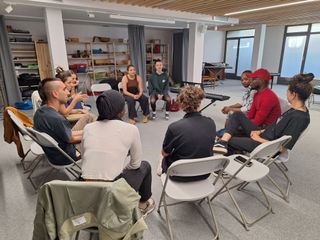
"Service learning is a teaching proposal that combines learning processes and service to the community in one project, so that it becomes an instrument of comprehensive training of students based on the real needs of the environment"
The service learning methodology in Social Education
Service learning, which forms part of several UVic-UCC degrees, takes on a special meaning in the bachelor’s degree in Social Education, considering that this degree trains professionals whose work will respond to needs to access culture, the well-being and participation in social life of groups at risk of social exclusion.
Service learning gives students of this degree the opportunity to learn from real practice, linked to the community and its needs. In this way, "students work with diverse groups, such as young people, elderly people or communities in a vulnerable situation, and can apply the theoretical concepts they have acquired,” noted Mar Beneyto, coordinator, along with Itxaso Tellado, of the bachelor’s degree in Social Education taught at UVic-UCC. Benyeto also highlighted that “in service learning, work is done on values such as solidarity, responsibility and commitment to society,” while students “learn about the importance of active listening, planning, leadership and adaptability, as well as other key competences to move towards social inclusion.”
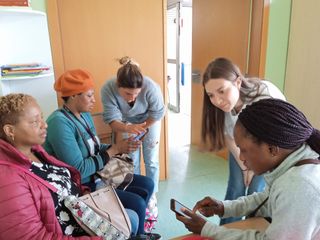
"In service learning, work is done on values such as solidarity, responsibility and commitment to society, and students learn about active listening, planning, leadership and adaptability"
In addition, service learning contributes to training individuals who are active and thoughtful with regard to needs in the environment. In this respect, Itxaso Tellado pointed out that "on the one hand, service learning enhances their critical capacity, because they observe social inequalities and barriers to social inclusion,” while "on the other hand, it increases their capacity for innovation and leadership, by providing strategies to improve people's conditions.”
"Service learning also enhances students’ critical capacity, and increases their capacity for innovation and leadership"
Synergy between the bachelor’s degree in Social Education and the Social and Digital Innovation Laboratory
The service learning proposals for the degree in Social Education arise from collaboration between the University, the entities and the community in the region. Throughout this process, the Social and Digital Innovation Laboratory (LISD), situated in the Remei Vic neighbourhood, plays an active role. This is a social, educational and digital project led by UVic-UCC, which studies, analyses and identifies social and digital inequalities in the territory.
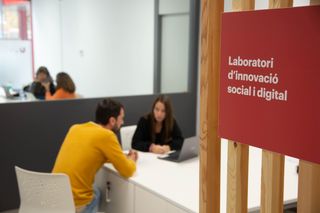
Through the results of the research and with the participation of community agents, the LISD promotes activities for social cohesion, citizen participation and digital competence, which take the form of support in service learning projects, workshops and training in the socio-digital field.
As indicated by the coordinators of the degree, the LISD poses a series of socio-educational challenges that are used in different subjects as a service learning opportunity, since they allow theory to be linked with practice. Subsequently, the students organize themselves to contribute socio-educational proposals, which are supervised by professionals from the entities, who guide the students to make decisions and implement initiatives. The degree coordinators also noted that throughout the process an attempt is made to maintain as horizontal a relationship as possible between students and participants from the entities, while ensuring that the actions that are undertaken are created jointly, with an inclusive approach and an intersectional gender perspective.
Efforts are made to ensure that the actions have an inclusive approach and an intersectional gender perspective
Service learning proposals with regional entities
Students of the bachelor’s degree in Social Education at the UVic-UCC have been participating for some time in various service learning proposals with Osona entities in the fields of education, youth, elderly people and mental health.
In the two previous academic years, the projects developed have focused especially on children and young people, and their families. Within this framework, various initiatives have been carried out, such as Support for the Digital Transition from sixth year of primary school to the first year of secondary school, with the Col·legi Sagrat Cor de Jesús school in Vic, a proposal for workshops and activities to enhance digital skills in the school environment for sixth grade children before they go on to secondary school. In addition, work was done on the Inclusive Digital Questionnaire for Families with the Escola La Sínia school. The aim was to create a digital form to ask the opinion and school needs of families in a highly complex educational centre.
Students of the bachelor’s degree in Social Education at UVic-UCC have been participating for some time in various service learning proposals with Osona entities
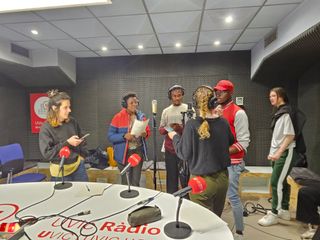
Designed for young people, the Digital Obstacle Course for Knowledge of the Region stands out, with the Associació Casal Claret. This project consisted of creating a digital obstacle course with the young people of the association. It allowed families of children from the entity to get to know several spaces in the city of Vic, especially play spaces. In addition, a project was developed to enable Catalan 2 students from the Montseny Adult Training Centre to use digital tools, such as games and applications, as a resource to learn the Catalan language. The project was called Digital Applications for Learning the Catalan Language and was undertaken with CFA Montseny. Similarly, the Quina Quina project, with the Casal Claret Association, enabled the creation of the necessary resources for organising and undertaking the Quina (bingo) during the main festival in Carrer de la Riera and surroundings in Vic. Pathways of Success is a proposal to put young people at the centre of their success stories, in collaboration with Vic Jove. In addition, with a focus on the area of violence, the Feminist Spot project, with La Fera Ferotge, consisted of creating a sound production addressing violence against women and LGTBIphobic violence, to be played in daytime and nighttime leisure spaces of the Osona region.
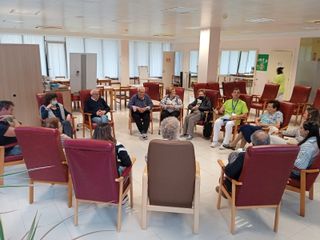
This academic year, the Social Education service learning projects focus on elderly people and mental health. Throughout 2024-2025, projects such as Photography for Elderly People will be undertaken, with the Sant Jordi day centre in Vic, so that users can learn to take photographs with their mobile phones. In addition, with ASHES, there is a service learning project called Stories of Women’s Lives, in which short audiovisual items are prepared about women who migrated to Catalonia in the 1960s and 1970s.
Similarly, a project is being carried out with the Residència Mas Vella Terra retirement home in Gurb that consists of making a report on how the residents understand and experience ties, called, appropriately, Vincles (Ties). And, finally, there is Memory of Remei, with the Grup de Dones Grans del Pont, which involves developing a memory game about the Remei neighbourhood for elderly people and children.
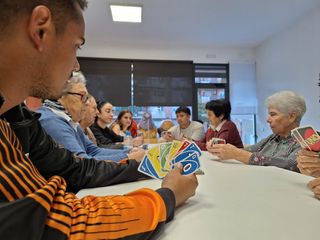
Grey piece: Service learning Pathways of Success
The service learning project Pathways of Success, developed with Vic Jove, an organization that offers guidance to young people and promotes their participation in cultural and leisure projects, is a socio-digital proposal that was undertaken in the 2023-2024 academic year. Service learning sought to make visible the success stories of the young participants to inspire and motivate others in similar situations, using digital tools to share and spread these stories of personal development.
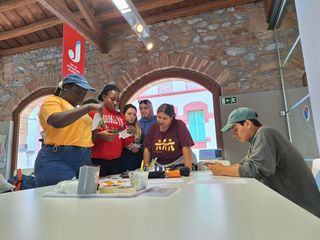

Cindy Peinado, who took part in this service learning project last year and is currently in the fourth year of Social Education at UVic-UCC, noted that, after having received more theoretical training during her degree, "putting this knowledge into practice through this methodology was a very real and challenging experience.”
In addition, she stated that this project provided an opportunity to work as a team and an occasion to test herself, in which she experienced, she said "the pressure and responsibility of providing quality support in a real context.” It also allowed her to improve her skills to manage situations in real time, and develop the ability to adapt to needs and objectives.
Participating in it made her appreciate life more and realise "that we all share very similar values and goals in life, such as happiness and ensuring the well-being of our loved ones." She considered that this work is a clear reflection of how society should be: equitable, inclusive and people-centred.
Grey piece: Service learning Stories of Women’s Lives
The service learning Stories of Women’s Lives, with the participating entity ASHES, an association that works to integrate people at risk of social exclusion, is a socio-educational proposal that consists of creating short audiovisual items to show the most important aspects of the lives of eight women who came from Andalusia to live in Catalonia during the 1960s and 1970s. This initiative encourages the women to reflect on their identity and self-knowledge and recognises and highlights them. These women were essential agents of the social and demographic change experienced by Vic, specifically in the Remei district, during that time.
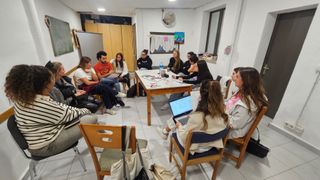

Adrià Canadell, a third year student in the Social Education degree at UVic-UCC, who is currently participating in the implementation of this project, highlighted the positive aspects of taking part. He believes that "participating in service learning allows you to develop many cross-disciplinary skills that are essential for an educator, at the same time, it leaves a lot of freedom for creativity when thinking about activities.”
In addition, he considers that direct collaboration with the professionals and the people who spend the afternoon at the association enables him to learn about their way of working and focus the education. "I feel that I learn from practice and direct intervention,” he explained.
He also believes that this participation has an impact on his personal development as a citizen, considering that he develops many cross-disciplinary skills, and he noted that he has realised he can contribute to the people around him and be useful to others. "This makes me feel very happy about myself,” he concluded.